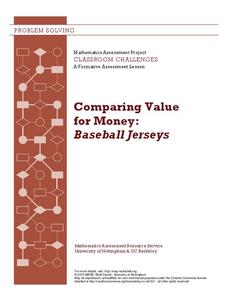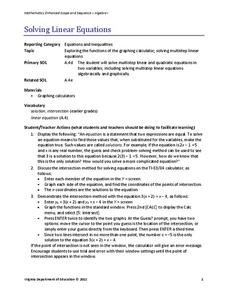Curated OER
Worksheet 19 Fall 1995
Students evaluate the equations that each variable is a function of time. They differentiate each expression with a comparison to the variable of t.
Curated OER
Roman Bernardo: Solving Linear Equations
Mathematicians use an inquiry method to solve linear equations. In this linear equations instructional activity, students practice solving equations using addition, subtraction, multiplication and division. They solve multi-step...
Charleston School District
Graphing Functions
How do letters and numbers create a picture? Scholars learn to create input/output tables to graph functions. They graph both linear and nonlinear functions by creating tables and plotting points.
Noyce Foundation
Boxes
Teach your class to think outside the box. Scholars use the concept of equality to solve a problem in the assessment task. They determine how to use a scale to identify the one box out of a set of nine boxes that is heavier than the others.
Curated OER
Solving Multi-Step Equations (Ch. 2.3)
Eighth graders solve multi-step equations, showing each step in their solution. This multi-step equations lesson plan includes sample problems to complete as a class, clear step by step instructions for the student and a linked comic...
Howard County Schools
Setting the Table
How many people can fit around a table? Depends on the size of the table, right? Explore patterns to generate an equation for the number of people that can fit around a table given its size.
Curated OER
Algebra...Your Second Language
Help learners translate word problems into algebraic equations. They will rewrite words using symbols and evaluate algebraic expressions using real life scenarios, animation sequences, video presentations, and activities to help young...
Pennsylvania Department of Education
What is the Chance?
Fourth and fifth graders make predictions using data. In this analyzing data activity, pupils use experimental data, frequency tables, and line plots to look for patterns in the data in order to determine chance. You will need to make a...
Futures Channel
Algebra Magic
Abracadabra! Letters can be used in math to represent numbers with the operations of addition, subtraction, multiplication, and division to solve problems! Math magicians will participate in an activity that uses a calculator and a bag...
Curated OER
The Customers
Exploring functions not represented by an expression is this task's secret. As your learners organize business customers in a database, they explore the definition of what it is to be a function.
Curated OER
Weighted Averages
Weighted averages can be tricky to explain! However, this study guide makes it easy for teachers by including definitions, explanations, and breaking down problems into three steps. Includes mixture problems and uniform motion problems.
Illustrative Mathematics
Rational or Irrational?
Is 4 plus the square root of 2 rational or irrational? After your class has gained a basic grasp of rational and irrational numbers, use this instructional activity to push them a little further in their understanding. Learners must...
Curated OER
Comparing Value for Money: Baseball Jerseys
Learners step up to the plate as they first complete an assessment task using linear equations to determine the best company from which to buy baseball jerseys. They then evaluate provided sample responses identifying strengths and...
EngageNY
What Is a Trigonometric Identity?
Protect yourself from identity theft! Establishing a strong understanding of the Pythagorean identity allows learners to prove that sine^2x + cos^2x = 1. They then use the identity to find sine or cosine ratios given the other.
Virginia Department of Education
Equilibrium and Le Chatelier’s Principle
The best part of learning about equilibrium is that nothing changes. Young chemists observe four demonstrations during this lesson: equilibrium in a saturated solution, equilibrium with an acid-base indicator, equilibrium with cobalt...
Illustrative Mathematics
Rectangle Perimeter 1
Creating an expression to represent the perimeter of a rectangle is a fundamental beginning skill in learning how to use and define variables. This activity starts with the basics and can be followed up with additional tasks.
Curated OER
Solving Absolute Value Inequalities
Start this activity with a brief description of how to solve absolute value inequalities. A space is provided to help classify the inequalities into types (greater than, less than, or equal to) and for learners to show how to graph their...
Virginia Department of Education
Solving Linear Equations
Practice solving linear equations by graphing. Scholars learn to solve multi-step linear equations in one variable by graphing both sides of the equation separately. They use graphing calculators to find the intersection of the graphs.
Curated OER
Building Sets of 13 and 14
Compose and decompose sets of 13 and 14 and compare sets of each with your little learners. They use objects to construct sets of 13 and 14, record their answers, and compare sets in several different ways.
Curated OER
Solving Equations
In this Algebra II worksheet, 11th graders use the properties of equality to solve multi-step equations in one variable. The tow page worksheet contains explanation, guided examples, and fifteen practice problems. Answers are...
Curated OER
Double This
Young scholars change verbal expressions to algebraic equations. They practice the vocabulary of algebraic equations.
Curated OER
Introductory Exponents
Young scholars participate in a lesson combining language arts with mathematics. First, they write a paragraph explaining what it means to multiply two numbers. Then students practice using exponents in different problems.
Curated OER
Complex Analysis: Polynomial Equations
In this polynomial equation worksheet, students explore real fractional powers of complex numbers. This three-page worksheet contains examples, explanations and approximately seven problems.
Curated OER
Complex Analysis: Polynomial Equations
In this polynomial equations learning exercise, students evaluate roots and draw vector representations. This three-page learning exercise contains four problems.

























